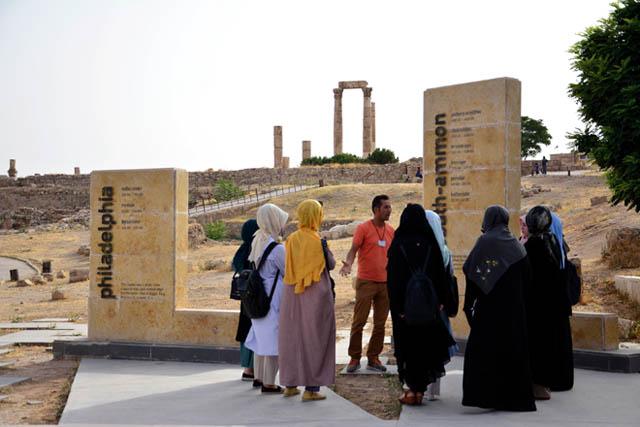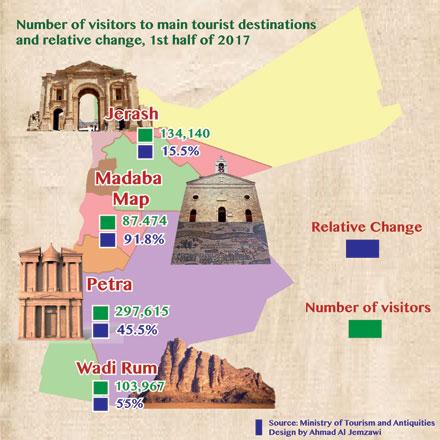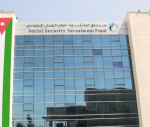You are here
Private stakeholders urge restructuring of Tourism Ministry
By Dana Al Emam - Dec 23,2014 - Last updated at Dec 23,2014
AMMAN — Private associations working in the tourism sector have called on the Tourism Ministry to “truly” engage them in the decision-making process in order to boost the sector’s revenues and sustain employment rates.
Five of these associations have published a complaint in Tuesday’s issue of Al Rai Arabic daily addressed to Prime Minister Abdullah Ensour, charging that the ministry works on its own and changes regulations “without taking public interest into consideration”.
They called for “restructuring the ministry”, highlighting the sector’s need for a minister who is completely dedicated to working for tourism. Tourism Minister Nidal Katamine is also minister of labour.
The increase in the sector’s revenues — reported for the first 11 months of 2014 at JD2.891 billion — is not due to an increase in the number of tourists and visitors, but to a “slight” increase in the spending of tourists during their stay in the Kingdom, said Michael Nazzal, chairman of the Jordan Hotel Association, citing a “large” drop in the number of visitors to Petra and Jerash.
“Seven hotels in Petra have closed down over the past three months due to a drop in the number of tourists,” Nazzal told The Jordan Times on Tuesday, pointing to the economic effect of the closure on employees and their families.
Describing the sector’s situation as “very difficult”, he called for “true and effective” partnership between the private and public sectors to minimise the effect of the region’s political unrest on the performance of the sector.
The hotelier cited the rise in operational costs, including water and electricity, as a major challenge to hotels, as electricity tariffs for hotels will increase by 15 per cent starting at the beginning of 2015.
Shaher Hamdan, president of the Jordan Society of Tourism and Travel Agents (JSTA), said the ministry’s amendments to the sector’s regulations put the Jordan Inbound Tour Operators Association in charge of inbound tourism, although it is officially registered at the Ministry of Social Development.
“This act benefits less than 30 elitist members of the JSTA, while the majority of association members, who are around 680, reject the division of jurisdiction,” he told The Jordan Times over the phone.
“We insist on standing united against the division of our tasks,” he said, adding that the society has repeatedly expressed its rejection to the ministry.
Meanwhile, Tourism Ministry Secretary General Issa Gammoh said the ministry is keen on communicating with private stakeholders, and has already implemented some of their demands and is still working on others.
“Our work intersects with the ministries of interior, transportation and industry as well as the Jordan Investment Commission, which sometimes affects the demands of private associations,” Gammoh told The Jordan Times over phone.
The ministry was able to reduce income tax on hotel and tourism facilities in Petra from 16 to 7 per cent, and has been working on protecting local travel agencies from foreign competitors by increasing fees on the latter.
He stressed that the ministry’s doors “are always open for dialogue”, adding that “irresponsible statements” lead to reluctance among tourists and investors to visit Jordan.
Gammoh urged associations to use unconventional means to promote tourism and sector services to counter the challenges of regional unrest.
Challenging Nazzal’s claims on business closures, the ministry official said in 2014, 13 new hotels started working and 87 others received initial approvals, adding that 57 new restaurants received work permits and 53 new travel agencies started working.
Related Articles
AMMAN — The Public Works Ministry and the Jordan Hotels Association (JHA) signed a Memorandum of Understanding on Tuesday to boost cooperati
AMMAN — Tourism officials on Thursday called for unified efforts to achieve the goals set for the tourism sector in Jordan.The Jordan
AMMAN — Jordan marked World Tourism Day on Wednesday, reporting an increase in the number of visitors and revenues, Tourism Minist

















